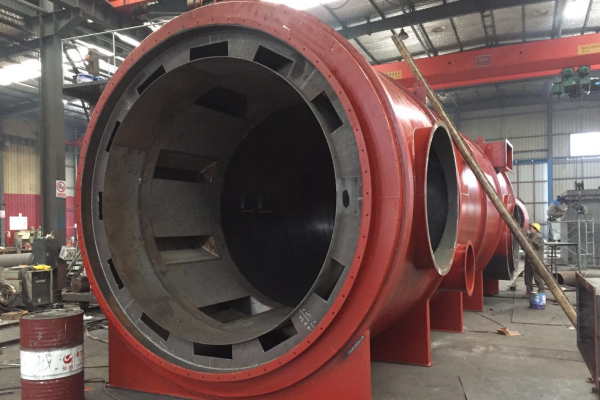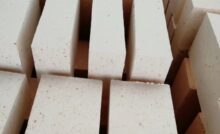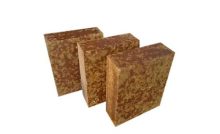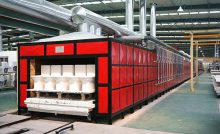

Em abril 2017, o 3# rotary top-fired hot blast furnace was cooled and then converted into a new top-fired silica brick alto-forno quente, e a operação de cozimento progrediu sem problemas. This paper describes the process of cooling and baking a 3# alto-forno quente.

![]()
Silicon brick has good high-temperature performance and low-temperature (below 600 ℃) instability. Once the silicon brick hot blast furnace is put into production, it can not be cooled down to below 600 ℃, de outra forma, it will cause the collapse and collapse of the masonry due to the sudden shrinkage of silicon brick. Atualmente, the silicon brick hot blast furnace has been able to carry out a better cool furnace operation.
Due to the different types of silicon brick hot blast furnaces in each steel enterprise, the differences in the size of the furnace, etc., silicon brick hot blast furnace cooling time, from the initial 80 para 90 days gradually reduced to about 20 days are successful examples. Although the silicon brick hot blast furnace can be cooled by a natural slow cooling method, steel companies generally use the fast cooling method because of the working period.
Em abril 2017, the hot air outlet temperature of the 3# hot blast furnace was high, reaching 400℃, the burner temperature was high, and it was suspected that the refractory material had fallen off, so the Ironmaking Division decided to cool the furnace operation for 3# alto-forno quente.
Before cooling the 3# alto-forno quente, the hot blast furnace was put in the stew state, and the pressure was held to check whether the cold and hot air valves and the pressure filling valve were tight, and if the leakage rate of the valve was too large, the limit level of each valve was adjusted after the pressure was filled to reduce the leakage rate of the valve as much as possible to ensure the smooth cooling of the hot blast furnace.
Cool furnace before cutting gas, em 3 # hot blast furnace gas combustion valve at the outer flange insert blind (point inspection station in advance to make blind shipped to the site).
(1) 3 # hot blast furnace began to cool the furnace, the mixing valve, shut-off valve, and mixed air regulating valve all closed, 3 # hot blast furnace and other three hot blast furnace parallel air supply, o 3 # hot blast furnace to do mixed air use, 3 # cold air valve to do for the use of mixed air regulating valve.
(2) to ensure the stability of the blast furnace wind temperature, when the 3 # hot blast furnace cold air valve is open to 80% of the valve plate stroke, the full shutdown 3 # hot blast furnace cold air valve, the full open pressure charging shut-off valve, pressure charging regulating valve to continue to send air, at this time the wind temperature adjustment using mixed air valve.
When the other top temperature of the higher hot air furnace air supply and then open the 3 # hot air furnace hot air valve, cold air valve, close the pressure charging valve for parallel air supply, at this time the mixed air valve is closed, so the cycle of air supply.
As far as possible, o 3 # hot air furnace stored heat to bring out, and reduce the flue temperature, to create conditions for the subsequent combustion wind cool furnace.
(2) When the 3 # hot air furnace sends out the temperature can not guarantee to do mixed air use (general temperature below 900 ℃ below), o 3 # hot air furnace to change the combustion wind cooler, and open the mixing valve.
(3) send air cooler to combustion air cooler operation: 3 # hot blast furnace in the stew state, fully open 1, 2 # flue valve, fully open the air valve, appropriate open air regulator valve. Using combustion air to cool the furnace, according to the cooling curve, accurate control of the air regulating valve opening degree. At the same time to ensure that the other hot air furnace burning required combustion air (according to the use of burning furnace air volume, at any time to adjust the amount of air used to cool the furnace to burn the furnace).
(4) control of combustion air cool furnace speed: 600 ℃ above by 5 ~ 10 ℃ / h control, 600 ~ 300 ℃ by 3 ~ 4 ℃ / h control, 300 ℃ below by 2 ~ 3 ℃ / h control.
① top temperature from 920 ℃ down to 600 ℃, cooling rate of 40 ℃ / shift, com 8 shifts.
② top temperature down to 600 ℃ when the constant temperature of 10 shifts.
③600 ~ 300 ℃ cooling time 12 shifts.
④300℃ constant temperature 12 shifts.
⑤ 300 ℃ down to 60 ℃ cooling time 16 shifts.
(6)The top temperature reaches 60℃, stop the combustion air to cool the furnace, and close the flue valve, air valve, and air regulating valve.
(7) open the upper and lower manholes, natural ventilation cool the furnace (open manholes before, hold the pressure test again, and check the 3 # hot air furnace leakage rate, to ensure that its leakage is the lowest before playing manholes).
(1) with combustion wind cool furnace process, encounter and cool furnace curve deviation. If affected by the hot blast furnace burner, according to the top temperature drop rate, adjust the amount of air, and control as smoothly as possible during the constant temperature stage.
(2) When the combustion air volume can not guarantee the air volume used in the cool furnace, the air volume required to keep the burner first, extend the cool furnace time appropriately, and change the 3# hot blast furnace to a natural cool furnace.
(3) When the hot blast furnace flue temperature of the cooled furnace reaches 400 ℃, stop the combustion of the wind-cooled furnace. After stewing, open the lower cold air branch manhole, open the upper manhole, and use the axial fan to blow back to reduce the flue temperature. When the flue temperature drops to below 100 ℃, close the upper and lower manholes, and change the combustion wind to continue to cool the furnace. So the cycle, when the top temperature is lower than 60 ℃, opens the upper and lower manhole to the natural cooling furnace, to the end of the cooling furnace.
(1) when the hot blast furnace cools furnace end, the upper and lower manhole all open, remove the manhole refractory bricks and pay attention to prevent burns, burns.
(2) after the end of the cool furnace will be 3 # hot blast furnace hydraulic system all disconnected, the hydraulic cylinder connection tube disconnected, lock the valve.
(3) will be 3 # hot air system supply power disconnected.
(4) hot air valve in the flange insert blind, (blind welding time of 16h), can take the opportunity to work on maintenance (completed before construction). If the construction does not have the opportunity to add a blind plate, the hot air valve flange inside the hot air branch pipe is cut 300mm, remove the internal refractory bricks, and add a temporary blind plate on the pipe to prevent hot air into the furnace.
(5) cold air valve, flue valve inside with asbestos will be valve body and gate plug tight, masonry brick wall in the pipeline, brick wall mud, surface grease seal, waste gas valve and pressure filling valve inside the flange insert blind.
(6) If the hot air pipeline in the 3 # hot air furnace plus blind, do a good job in advance 3 # hot air valve support to prevent the hot air valve deflection caused by deformation of the pipeline.
HISCO Chenggang cooled down the 3# hot blast furnace and then converted the 3# hot blast furnace into a new top-fired hot blast furnace, which was baked in November 2017. The converted hot blast furnace high-temperature area also uses silicon brick lining, because the silicon brick in 270 ~ 310 ℃ e 570 ~ 610 ℃ lattice transformation volume expansion characteristics, so the silicon brick hot blast furnace in the baking process temperature must be controlled accurately.
(1) slowly drive away the moisture within the hot blast furnace masonry to avoid rapid temperature changes, so that the masonry water suddenly evaporates in large quantities, resulting in damage to the refractory; so that the refractory brick uniform, slow and full expansion. Avoid masonry refractory damage caused by thermal stress concentration or lattice transformation to extend its service life.
(2) Make 3# hot blast furnace heat storage chamber lattice brick accumulate enough heat, after put into use can provide high wind temperature for the blast furnace.
(1) 3 # hot blast furnace baking process, the left and right arch side temperature as a reference basis for temperature rise, taking into account the exhaust gas temperature and silicon brick interface temperature for baking.
(2) The nature of the refractory material is very different, the oven is baked strictly according to the baking curve, and the actual arch temperature curve of the oven is made as close as possible to the corresponding value in the baking curve by adjusting the gas and air pressure air flow. Vault temperature in the range of 100 ~ 700 ℃, the temperature deviation should be controlled at ± 2 ℃; if vault temperature exceeds 700 ℃, the temperature deviation should be controlled at ± 3 ℃.
(3) Baking continuously, interruption is strictly prohibited, if for any reason can not be normal baking, insulation is required.
(4)In the process of oven drying, pay attention to the control of the flue temperature, to avoid improper control leading to the flue temperature rising too fast so that the top high-temperature area can not be controlled by the temperature required for oven drying.
(5) At the end of baking, close the oven manhole, and lead the blast furnace gas through the burner normal burning furnace, gas conversion process time is not too long, lead the blast furnace gas when the arch side temperature is not less than 900 ℃.
(1) 3 # hot blast furnace masonry is completed, accepted, and qualified according to quality standards, the site is cleaned up and tidy, and safety facilities to restore completely.
(2)All detection instruments run accurately, and the cooling system cooling water pressure, and water flow are normal.
(3) 3 # hot blast furnace baking before the commissioning of the hydraulic and electrical systems of the valves is completed, linkage commissioning, with manual and automatic operating conditions.
(4)The installation and commissioning of the mixed gas pipeline and valve for the furnace are completed, the switch is flexible, and the mixed gas and air-pressure wind is led to the hot blast furnace before baking manhole valve (mixed gas pipeline pressure test leak, the glasses valve is commissioned in advance), the work is completed before November 17, 2017.
(5)lay two layers of clay lattice bricks in front of the big wall of the oven manhole 2000mm in front of the position of the circumference, each layer covers an area of about 8m2, lattice bricks before the additional firewall, the height of the wall is 800mm. lay a 2mm iron plate on the surface of the clay lattice bricks laid, iron plate every 150mm evenly cut 10mm small holes.
(6) Make 2 oven burners, insert the oven burner into the combustion chamber through the manhole on the arch side, and the insertion length is 2500mm (ou seja. the distance from the flange surface of the manhole to the center line of the burner head). Make one DN50mm ignition gun. Manhole set shield plate or use refractory bricks for shielding, to prevent a large amount of air into the hot air furnace, cut a 50mm peephole on the plate or temporary brick wall to leave a 50mm peephole, used to visually inspect the flame.
(7)The blind plate of the outer flange of the combustion valve is not removed in the early stage of baking (when the temperature of the arch side reaches 900℃, the blind plate is removed to introduce blast furnace gas for baking).
(8) in the hot blast furnace arch side and silicon brick interface to install the temporary thermocouples used in baking 2.
(9) Remove 3# hot blast furnace cold air branch pipe, flue branch pipe, hot air outlet safety protection wall, and shield.
(10) With baking conditions, open the flue valve, air valve, and air regulating valve, 3 # hot blast furnace blowing back, so that the heat storage room airflow is smooth. After blowing, close the air valve and air regulating valve, the flue off to the required control level for baking, ready for baking.
3 # Hot air furnace baking using mixed gas as the combustion medium, compressed air as the combustion medium, and plans to start at 15:00 on November 21, according to the characteristics of the silicon brick into different heating stages for baking.
(1) 20 ~ 200 ℃ heating period of 5 dias, heating rate of 1.5 ℃ / h. 200 ℃ constant temperature for 5 dias.
(2) 200 ~ 300 ℃ warming for 4 dias, heating rate of 1.0 ℃ / h. 300 ℃ constant temperature for 5 dias.
(3)300~600℃ warming period is 10 dias, warming rate of 1.25℃/h. 600℃ constant temperature for 6 dias.
(4)600~800℃ heating period is 4 dias, heating rate 2℃/h. 800℃ constant temperature for 2 dias.
(5) 800 ~ 1000 ℃ heating period of 1 day, and then turn the blast furnace gas normal firing furnace, so that the hot air furnace as a whole to further completes the baking, the temperature continues to rise in a balanced manner to reach the level of wind temperature required by the blast furnace.
(6) The whole baking process is carried out according to the baking curve. Carefully adjust the gas volume according to the top temperature change, every 2~4h.
The actual baking time and temperature control are shown in Figure 2, the actual baking time is 39 dias. After the end of the baking oven closed the oven manhole, was the hot blast furnace pressure test, after passing 3 # hot blast furnace into production.
(1) Bake the furnace by the requirements of the oven curve to raise the temperature.
(2) Hot blast furnace flue valve is in the open state before ignition and baking.
Other valves are in the closed state. During the baking period, the hot blast furnace needs to maintain a low negative pressure (according to the flue gas temperature and the top of the pumping force to adjust the flue valve opening), the initial ignition using the ignition gun to heat up, you can completely close a flue valve, adjust the other flue valve opening.
(3)When the gas network pressure is low, contact the dispatcher in time to ensure the gas supply and avoid stopping the baking hot air furnace midway.
(4)The oven operator should often observe the burning of gas in the oven burner. Because the early baking refractory moisture, will cause the flue pumping force to be small, the mixed gas burner flame combustion is extremely unstable, more difficult to control, and should be closely observed. Once the fire should immediately turn off the mixed gas and air pressure wind, 5 ~ to 10min later, check to confirm the residual gas in the furnace after the net, re-ignition.
(5)When adjusting the gas and airflow according to the oven curve, do not adjust continuously. The amount of gas needs to be adjusted carefully according to the arch side temperature indication; be steady when adjusting the amount of gas, not too fast, to avoid excessive temperature control changes. When the arch side temperature is low, increase the gas flow appropriately, increase several times, and do not increase at once; when the arch side temperature is too high, reduce the gas flow appropriately, and do not reduce the amount too much. Each adjustment properly adjusts the ratio of air and gas, to ensure that the arch reaches the ideal temperature.
(6) such as the occurrence of electrical or mechanical and other unexpected accidents, affecting the oven, should quickly close the oven burner on the gas, air, and other valves, to continue to bake after the accident treatment.
(7) such as the oven temperature due to instrument measurement problems, immediately repair, at this time to maintain the amount of oven gas, combustion air volume unchanged; wait for the instrument to be repaired, if the temperature exceeds or is lower than the planned value, should be adjusted according to the oven curve heating speed. When the temperature is lower than the planned value should extend the oven time; higher than the planned value for constant temperature, wait and develop the oven curve time overlap, and then continue to heat up.
(8) According to the oven time and flue temperature adjustment flue valve opening, after the end of the oven, 100 ℃ < exhaust gas temperature ≤ 400 ℃.
(9)During the baking process, check the expansion of the new transformation part of the hot air furnace body at any time and mark it well.
(10) baking furnace in a large abnormal situation, promptly notify the relevant leaders and do a good job of insulation work.
(11) blast furnace production, the other three hot blast furnaces in the change of furnace before releasing exhaust gas, notify the site in advance baking personnel, pay attention to observe the 3 # hot blast furnace burner combustion. The discharge of exhaust gas slowly discharges, to avoid the backflow of flue gas into the 3 # hot air furnace affecting the baking.
(12) removal of 3 # gas branch blind, blast furnace in advance to make preparations, cut gas after blowing, gas pipeline gas and oxygen content testing, testing qualified before notifying the construction staff work (blind removal operation time plan 6 ~ 8h to complete).
(1) before baking a comprehensive safety inspection, in addition to the arch side of the oven baking manhole other openings must be effectively blocked.
(2) Remove the blind and brick wall before the dangerous work safety permit.
(3) Newly connected gas pipeline in the lead gas before the pressure test, check whether there is leakage in the weld.
(4)Lead the gas in strict accordance with the operating procedures for the operation, before ignition to do the outbreak of qualified test.
(5) fire in the middle of the fire, the post should be confirmed according to the order of operation when re-ignition, the gas area is prohibited to work alone and must carry a gas alarm.
(6) 3 # hot blast furnace to blast furnace gas burning furnace, in the removal of combustion valve blind to do gas protection measures.
o 3# hot blast furnace of HISCO Group Chenggang Company was originally a rotary top-fired silica brick hot blast furnace. in April 2017, HISCO Chenggang cooled the 3# rotary top-fired hot blast furnace, and it took 19 days to cool the furnace. After that, o 3# hot blast furnace was converted into a new top-fired silica brick hot blast furnace, and in November 2017, the new top-fired hot blast furnace was baked, which took 39 dias. The practice proved that the cooling and baking of a 3# hot blast furnace was successful.
Desde outubro, os preços da alumina continuaram a subir, and China's largest bauxite importer - a…
Primeiro, Tijolo de alta alumina: The Leader In High Temperature Refractories As a leader in high-temperature…
The application of refractory bricks in the kiln immediately endangers the operation rate of the…
Analysis Of The Causes Of Common Quality Problems In Tunnel Kiln Construction And Measures To…
Corundum quality refractory castables are made from corundum to the new jade refractory insulation material…
Análise de matérias-primas refratárias de alumínio-silício Prof. Li Yong of the University of Science and…



